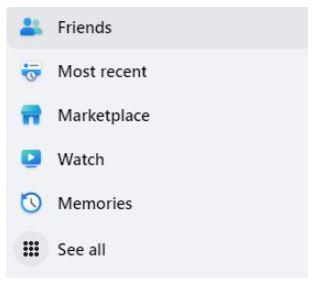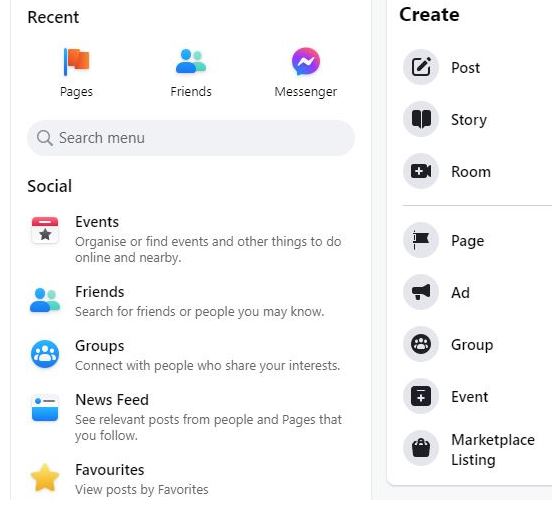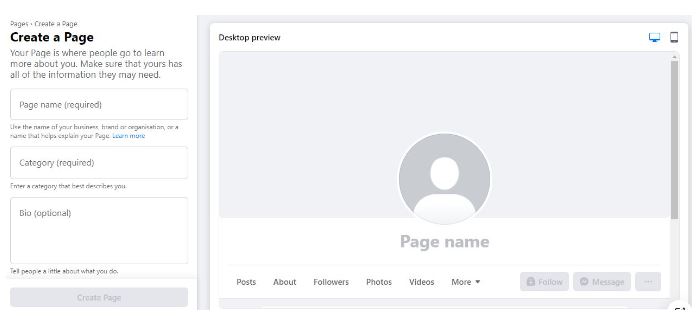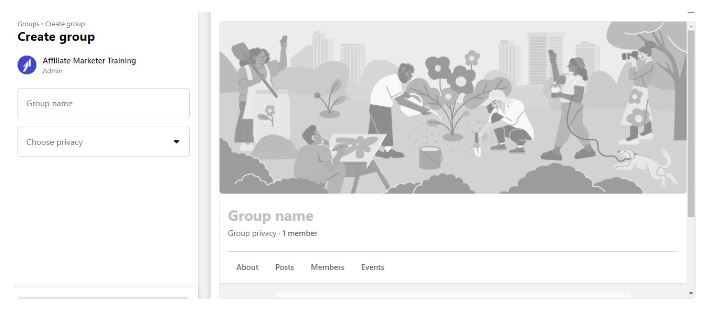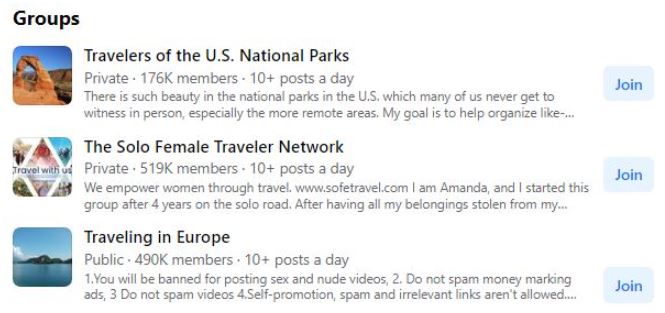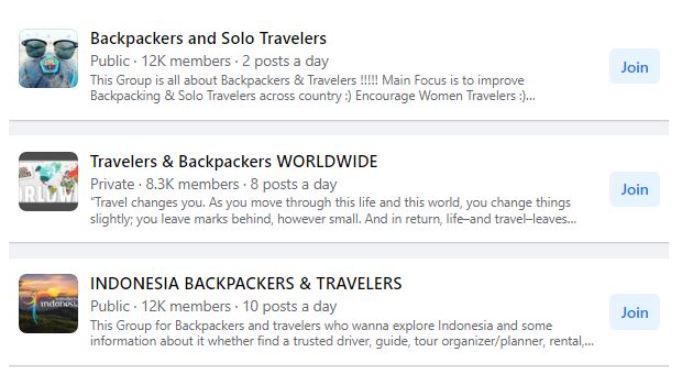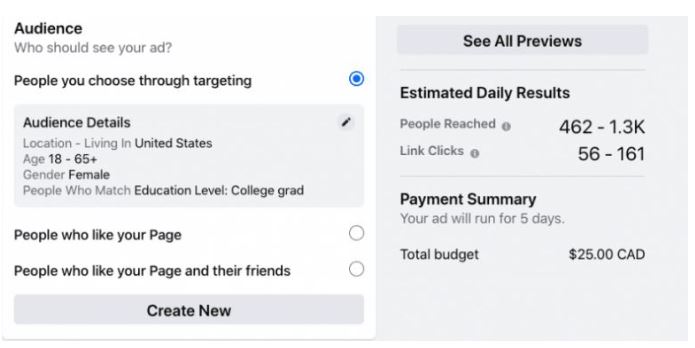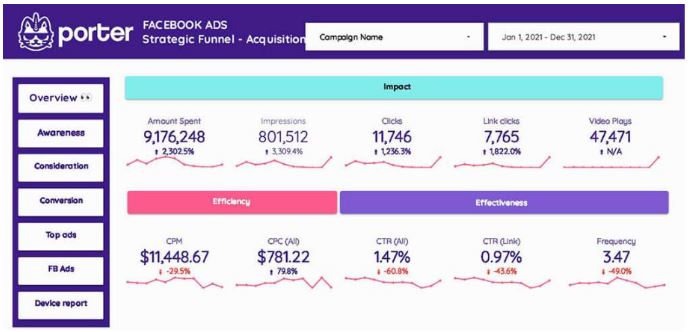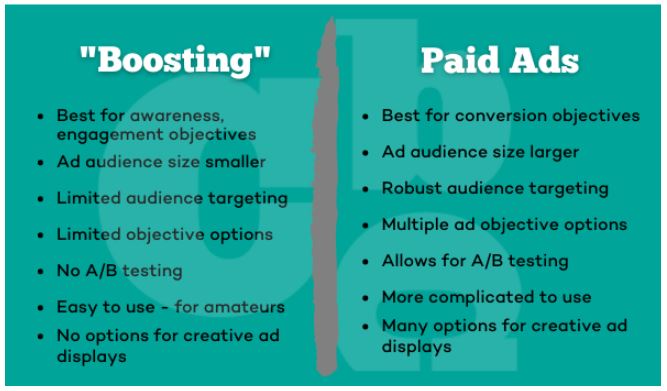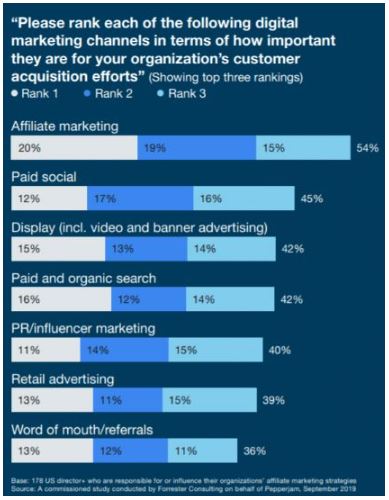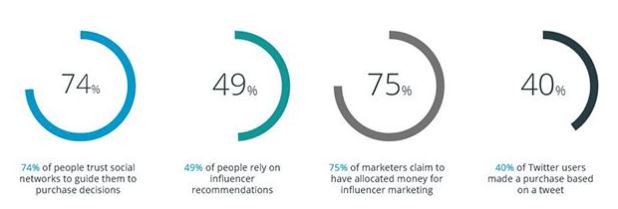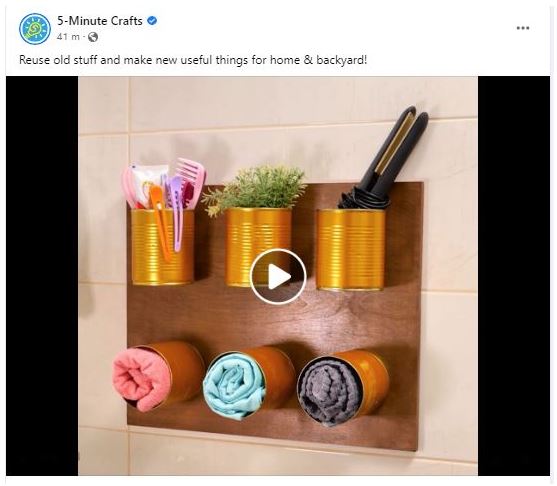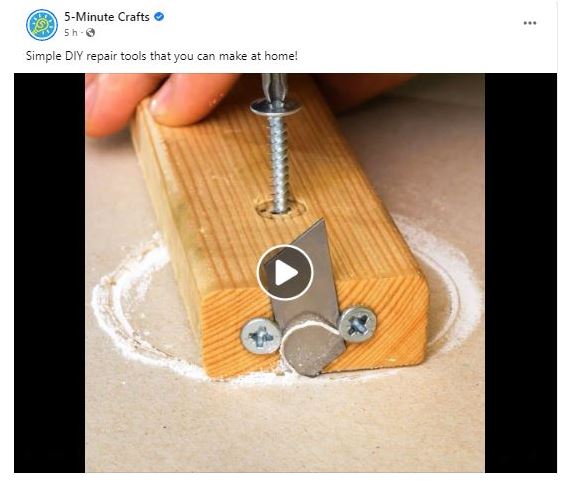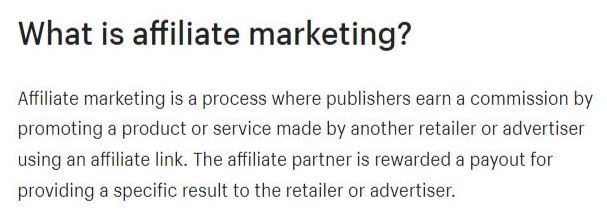I’ll admit.
I’ve spent many useless hours scrolling through Facebook.
And I’m pretty sure you have, too.
Wouldn’t it be great if you could make money from that?
If we could turn those useless hours into money-generating hours?
I have 3 words for you — FACEBOOK. AFFILIATE. MARKETING.
That’s right.
I know, I know.
It can be scary to jump into something new — or maybe you’re just too busy to figure out the ins and outs.
Well, I’m here to tell you all you need to know, from how to start affiliate marketing on Facebook, tips for grabbing an audience, the pros and cons, and so much more.
So shall we?
What is Facebook Affiliate Marketing?
Let’s say you’re a new affiliate marketer…
…You already chose your niche…
…You already have a website…
…You already joined affiliate programs…
You’re more than ready to succeed!
NOT SO FAST.
Remember, there’s a lot of competition.
Just type in your keyword into Google search and see how far down your website is.
I thought so.
But please, don’t be discouraged.
Instead, take advantage of Facebook’s in-built audience —- yes, that’s a whopping 3 billion monthly users.
There, you can bring more people to your blog or website.
Or, you could promote your affiliate links directly on Facebook.
Whatever the case, you’ll be able to grab an audience…
And the more audience you have the more chances of selling your affiliate products and earning a commission.
How to Start Affiliate Marketing on Facebook in Just 4 Steps
Hear me out.
Facebook affiliate marketing is so easy to get started — but that doesn’t mean you don’t have to put in the work.
I’ll show you what I mean as we walk through the 4 steps.
How to Start Affiliate Marketing on Facebook Step 1: You Need a Facebook Presence
Do you know what’s great about Facebook?
It’s so easy to make a presence there.
Unlike creating your own website — now that comes with a lot of headaches.
On Facebook, all you need to do is…
Log in to your personal account and click “see all” on the left side handle…
…Choose to create a page or group…
…And fill out the details.
As you can see, all these are easy to do — but it still requires you to ‘THINK’.
Case in point, you need a catchy name (make sure it’s related to your niche or website), a short but detailed “about” description, and whether to go for a Facebook page or Facebook group.
Here’s one tip I’d like to share — know the difference between a page and a group. A Facebook page is more like a website. You post content and your audience interacts with it. A Facebook group, on the other hand, is more like a community. Members can post their own content to the group. What brings more people in? I’ll talk more about this later on. |
How to Start Affiliate Marketing on Facebook Step 2: Post AWESOME Content
Have you ever seen those Facebook pages that always spam you with “Get this!”, “Order that!”, “Click here!”?
Annoying, right?
I won’t be surprised if you decide to “unfollow”.
Well, what’s true for you is also true for others.
The last thing you want is to force ads on people’s faces.
What you need is good content.
No, no, not good — AWESOME.
That means posting content that’s relevant, useful, or enjoyable — something that makes people interact.
Take Oreo for example.
Source: devrix.com
Who can resist checking out the latest frozen pop culture?
And who can resist sharing it with their friends and family?
More than that — you need content that builds trust.
So when you do promote, they’ll know that it’s worth checking out.
Want a tip? Use the 80/20 rule. 80% of your posts should be educational, entertaining, shareable, and encourage interactions. The remaining 20% should be for promotions. |
How to Start Affiliate Marketing on Facebook Step 3: Don’t Forget to Stick to the Rules!
“BUY THIS PRODUCT TO LOSE 10 POUNDS IN 1 WEEK!”
That is most definitely a scam — or a really dangerous product.
Well, to protect its users, Facebook has a whole list of guidelines when it comes to “advertising” on the platform.
And it’s not just Facebook.
The Federal Trade Commission (FTC) says you MUST disclose your affiliate links.
Different states and countries have their own guidelines.
Even affiliate programs, like Amazon Associates and Clickbank, have rules on Facebook.
Amazon Associations actually doesn’t allow you to post direct affiliate links on your Facebook ads!
This is why it’s important to read the fine print before joining a program.
Here’s another helpful tip… If you ask me, I’d say don’t add direct affiliate links to your Facebook posts. Instead, direct the post to your, say, website — from there, you can convince the person that what you promote is valuable to them. Why do I say this? Well, some affiliate programs don’t allow it. Another reason is that Facebook tends to ban a lot of direct affiliate links. Sure, you can ask them to lift the ban — but not without its inconveniences. |
How to Start Affiliate Marketing on Facebook Step 4: Bring the People In
So you set up your Facebook page/group…
You created awesome content…
You made sure you followed all the rules…
None of that will mean anything without an audience…
The 7 Ways to Grab a Facebook Audience
How do you get people to follow you?
Hope against hope that they randomly find you?
Of course not!
Let your family and friends share your page or website?
No, that simply won’t do.
Use Facebook’s marketing strategies?
A big, resounding - YES!
And the best part?
There are so many strategies!
Just choose from any (or all) of these…
1. #Hashtags
Okay.
Facebook hashtags aren’t as effective as Instagram or TikTok hashtags — but hey, it still works.
Your post has a 12.6% chance of being seen by others.
And with your awesome content, people’s interest is sure to peak, which will lead them to like the post, comment on it, share it, or better, check out your page and follow it.
That goes without saying, you should always use relevant hashtags.
2. Go Where the People Are (Join Other Groups)
Let’s say you’re in the travel niche.
Type “travelers” on the Facebook search and you’ll be led to so many travel groups with — get this — THOUSANDS if not MILLIONS of followers.
Source: Facebook
You can even find groups that are more specific to your niche.
Maybe you’re all about backpack travelers — or solo travelers.
Yes, yes.
But what do you do when you join these groups?
I hope you’re not thinking about dropping your Facebook (or website or affiliate) link right out of the blue.
No one will listen to you…
…And that’s if you’re even lucky to get your post past the page owner’s approval.
Instead, always engage.
Be helpful.
Post those funny memes.
Give useful information.
Answer questions.
Build trust (with the page owner and group members).
If that’s your focus — then it’ll be easier to drop a link and not be rejected.
3. Slide into DMs
Ahh yes, the universal way to get people to notice you.
Maybe there’s someone in that group you joined that has a question — or maybe it’s a problem.
And you know the answer.
You can DM them to help.
The theory is the same — You build a strong relationship, so when you do advertise to them, the person will trust that you have their best interest in mind.
I do have something to say, though.
Facebook hates Messenger spam. If you send a direct affiliate link, it’s surely going to get banned.
My point is - make sure the links you send are for your Facebook page or website instead.
4. Take Advantage of the Facebook Algorithm
Do you ever wonder how a random video about cats can go viral?
Then there’s your well-thought-off, well-executed, high-quality video that only got 2 views…
INTERACTION.
The more interaction on your post, the more in favor you will be with Facebook’s algorithm.
So go ahead and post those interesting content, beautiful images, helpful videos, funny memes, opinion polls…
…Interact with anyone and everyone…
And make sure to do it regularly.
But wait…
If you rely on this marketing strategy, this is where it differs between a Facebook page and a Facebook group.
Let’s take some time to look at that…
Facebook Page vs Facebook Group
I already hinted at the difference between a page and a group earlier.
But when it comes to the Facebook algorithm, I’d say a group is the better option.
Why?
Well, back in 2016, Facebook basically killed organic reach through pages.
You now need a budget for ads to get people to even see your page.
Thankfully, that update didn’t affect Facebook groups.
So the more you post, and the more interaction you get, the more your group will be “out there”.
5. Pay for Facebook Ads
All this time, I’ve been talking about organic marketing.
And yes, that works.
But do you want to know what works even more?
You got that right — paid marketing.
This is a surefire way to bring the flocks in.
With Facebook’s Ads Manager, you can get very specific.
Just look at the ad target below.
Source: blog.hootsuite.com
You can even see how your ads are performing!
Source: portermetrics.com
Okay, okay.
Again, I need to point you to the rules.
Facebook ads should only promote your website, grow your audience, or boost post engagement.
It should NEVER advertise your affiliate links directly.
6. Boost Your Posts
This is very similar to Facebook ads.
But this time, your post isn’t an ad itself — it’s a regular post.
You boost that post so it can reach a wider audience.
I found this chart helpful to know the difference between boosts and ads.
Source: cerconebrown.com
7. Contest Time!
“GIVEAWAY!”
I don’t know about you, but this simple word always stops my scrolling…
I mean, I get a chance to win a box of art supplies just by following, liking, tagging some people, and sharing the post?
I’m in!
Now, can you imagine how many followers you can get with that?
And, with your awesome content, you can make them stay — and not just for the chance of winning something.
Of course, you can get very creative with it, too.
Maybe you can let the people submit their artwork, and the best one wins a supply haul.
This will bring lots of artists in to show off their creative skills. Plus there’s a chance to win a great prize.
If you do plan on running a contest, make sure it complies with Facebook’s contest guidelines.
The Pros and Cons of Affiliate Marketing on Facebook
I’d be lying if I said that Facebook affiliate marketing is all pros and zero cons.
Now, do the pros outweigh the cons?
I’d say, YES.
But that’s for you to decide.
The Pros
You already have a built-in audience of 3 billion active users.
There are many strategies to capture an audience (I listed 7 of the best ones).
It’s super easy to get started (I mean, anyone can create a Facebook page or group).
Investment is little to none (the only thing you really need to pay is for Facebook ads)
People can access you anywhere (Facebook doesn’t require a laptop, unlike a website).
You can use Facebook to build trust and engage with people — more than in a blog.
The Cons
Facebook affiliate marketing requires work (and that’s on top of managing your website and affiliate programs).
Advertising on Facebook comes with SO. MANY. RULES.
The only real way to grab LOTS of people is through paid ads (organic marketing just isn’t as effective, unfortunately).
Facebook is always updating its Terms of Service (you might get a strike).
The Power of Affiliate Marketing on Facebook
Maybe your question isn’t…
“Should I do affiliate marketing on Facebook?”
But…
“How effective is affiliate marketing on Facebook?”
How do you know you’re not just wasting your time?
Well, if you want stats — I’ll give you stats.
Source: pepperjam.com
According to Pepperjam, an affiliate marketing solutions provider, paid socials (this could mean Facebook affiliate marketing) is ranked second.
And, through Blogging Wizards studies, we see that at least 74% of people trust social media networks to make a purchase.
Source: bloggingwizard.com
I’ve been saying it a lot — and I’ll say it again — Facebook has almost 3 billion active users.
That’s around 35% of the world's population!
Imagine having almost half of the population at your fingertips.
I get it.
You might be skeptical and think, “But Facebook is for connecting with others — not for buying stuff.”
EXACTLY.
That’s what you’re going to do.
Connect with your audience through useful, valuable, funny, and heartwarming content.
And when your audience loves your content, they’ll follow you…
They’ll look forward to your posts…
They’ll trust your advice…
They’ll visit your blog…
They’ll buy from your affiliate links.
Take 5-Minute Crafts for example.
Source: Facebook
Source: Facebook
They created a HUGE following by posting short, fun videos about useful tips and tricks.
No spammy messages.
No hard sales.
Just purely helpful tips and tricks.
Now, if they do promote a product, do you think people will buy it?
You bet!
And it’s not even just that.
Facebook affiliate marketing can rank your website in Google search.
Though, mind you, not directly but indirectly.
What do I mean?
Let’s say you write an epic blog post about gaming…
You share it on your Facebook page, group, or other related groups that you joined…
It blows up…
The post receives thousands of likes, comments, and shares…
A thousand more people check out your blog…
Some even love it so much that they decide to link it to their posts or blogs…
Your website traffic soars up…
These are the kind of factors that Google loves to rank.
And as always, the more “seen” you are, the more commissions you can get.
FAQs
I’ve no doubt that you still have some questions.
I’ll try to answer those by going through the most frequently asked questions about affiliate marketing on Facebook.
Is Affiliate Marketing Allowed on Facebook?
For the short answer - yes, it is. No need to worry about that.
But why did the affiliate link that you sent on Messenger get banned?
About that.
Facebook has a whole set of rules when it comes to “advertising” on its platform. I highly advise you to read through it before committing.
Which Social Media is Best for Affiliate Marketing?
I wish I could give you one answer.
But the truth is — it depends.
On a lot of things.
For one, there’s your niche you have to consider.
Then, you need to know who your audience is.
Are you targeting business-minded people? Then LinkedIn is a top choice.
Maybe you’re targeting the millennials? Then Facebook is where most of them are at.
Or maybe it’s the playful Gen Z you’re after? Then Instagram or TikTok is a good platform to advertise on.
This is a whole topic on its own — luckily, I give you some pro tips on how to use social media for affiliate marketing.
Should I Focus on Facebook Affiliate Marketing Over Blogs?
I’m not totally against it…
But if you ask for my advice, I’d say use both.
A blog is a great way to expand on your niche — or the product you’re selling.
Plus, it’s your own website — unlike Facebook, which is a third-party platform. Whatever they say goes.
But of course, do Facebook affiliate marketing to get people to your blog.
It works hand in hand.
Yes, you’ll have to put in extra work.
But it’s worth it.
What is Affiliate Marketing?
Okay, so you’re a total beginner.
And none of what I’ve just said means anything to you.
That’s fine.
We all have to start somewhere.
Here is how Google describes affiliate marketing:
And here is how Shopify explains it:
Finally, here is how I put it.
Should You Start Affiliate Marketing on Facebook?
It’s so easy to get started…
You have an in-built audience of almost half the population…
You can create stronger bonds and relationships…
You can direct more people to your blogs or affiliate links…
You can earn more commissions.
But it’s not all sunshine and roses.
There is hard work involved…
Patience…
Extra hours…
Brainstorming…
Are you willing to go through all that?
If yes, then you can get started right away.
If not, I understand - it’s not for everyone.
If maybe, then take the time to reread the article, go through all the info I provided, do your research, and see if it’s for YOU.
And if you have any questions, make sure to hit them in the comments.

